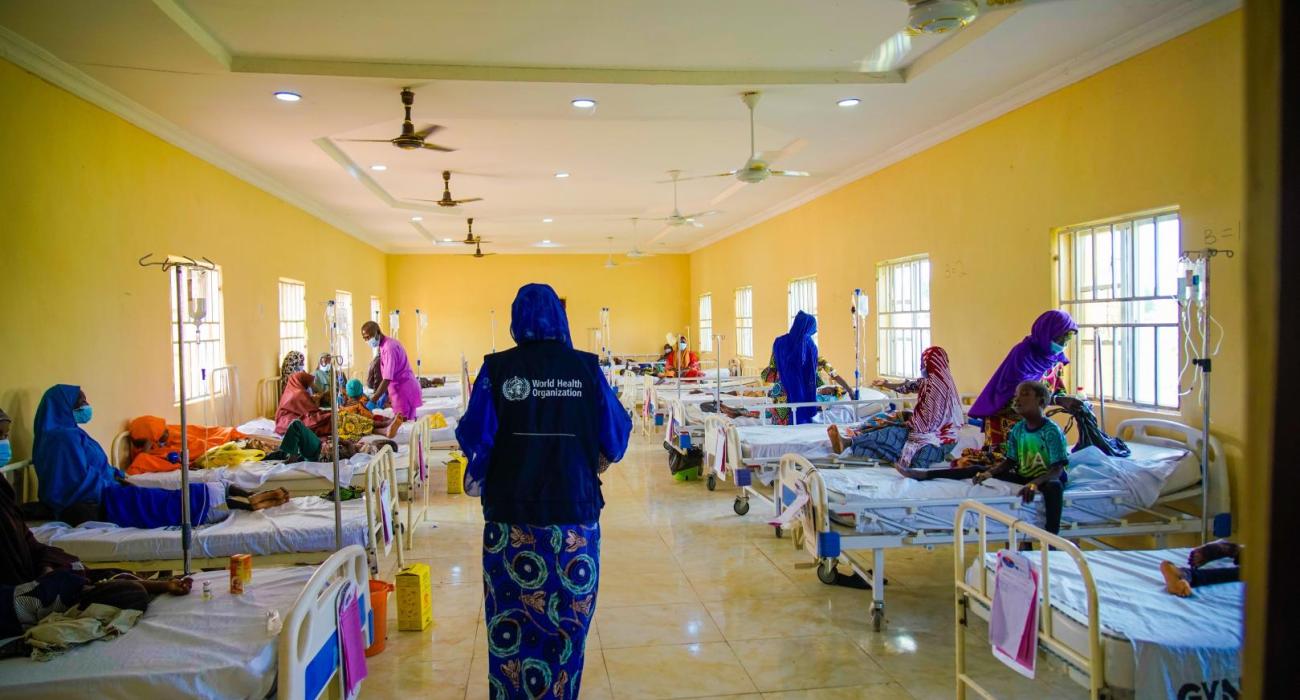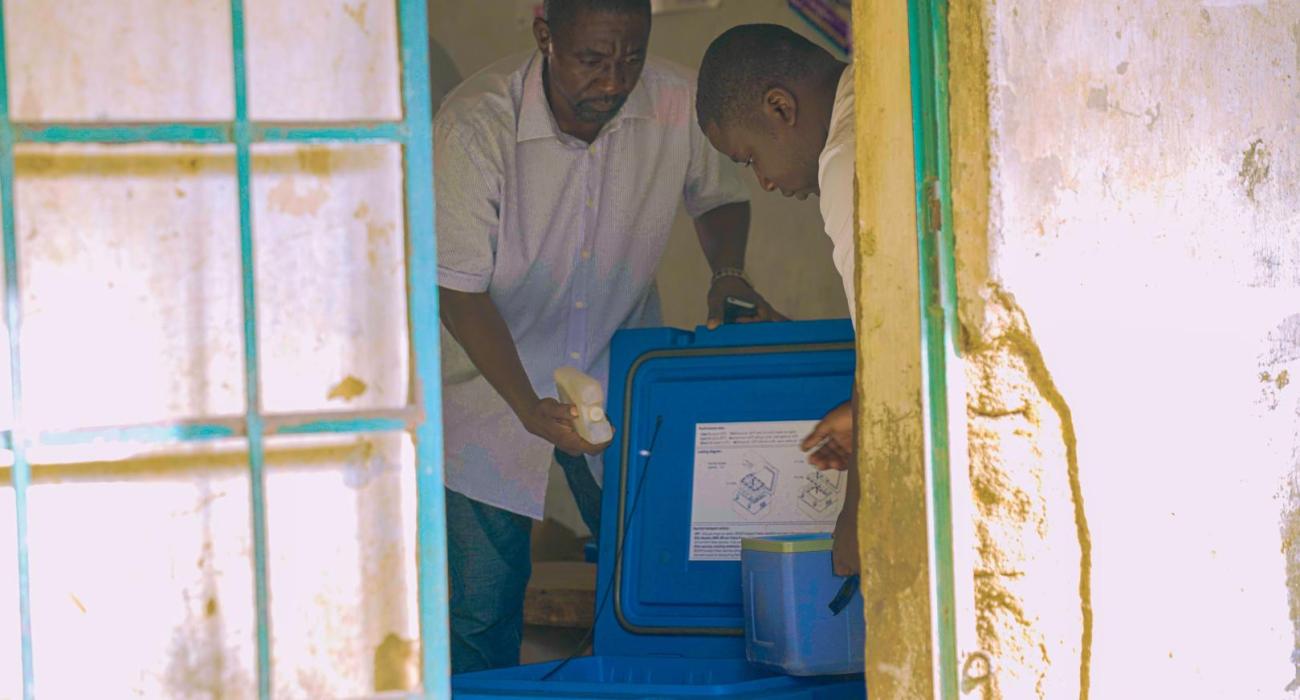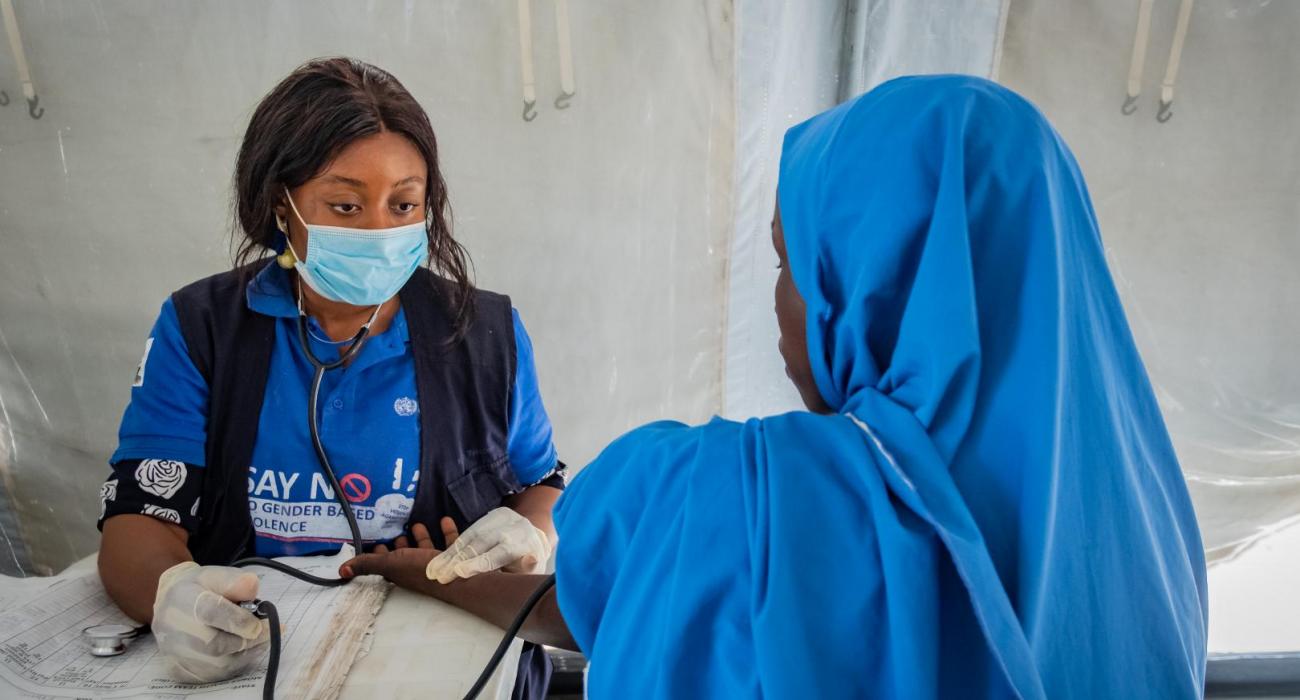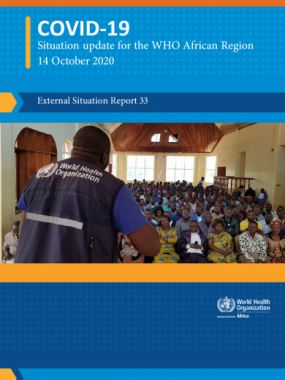| Total population (2022) | 218,541,212.00 |
| Demographic Growth (2022) | 2.54 |
| GDP growth (Annual %) (2022) | 3.25 |
| GDP per capita(per capita in US$) 2022 | 2,162.63 |
| Inflation rate (%) 2022 | 11.31 |
| Country Size (km sq) 2021 | 910,770.00 |
Nigeria
Renseignements de Pays
Données & statistiques
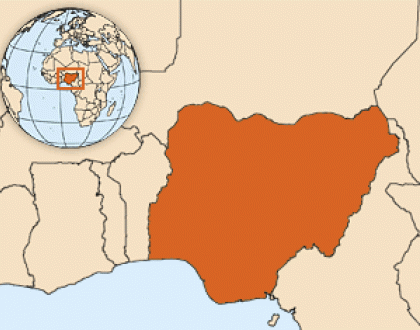
Country Health Topics
The Nigeria country health profiles provide an overview of the situation and trends of priority health problems and the health systems profile, including a description of institutional frameworks, trends in the national response, key issues and challenges. They promote evidence-based health policymaking through a comprehensive and rigorous analysis of the dynamics of the health situation and health system in the country.
Human resources for health
The Federal Ministry of Health has a Human Resources for Health Unit whose functions include the planning, production and management of health manpower at the national level. As part of its planning function, the Unit has produced a Draft National HRH Policy in collaboration with the WHO and is about to develop an implementation plan for the policy.
Nigeria has a number of colleges of medicine, pharmacy, and nursing/midwifery involved in the basic and postgraduate/high level training and re-training of doctors, pharmacists, and nurses/midwives respectively. School of Radiography handles the training of radiographers while Schools of Health Technology train professionals such as Community Health Officers, Community Health Extension Workers, Laboratory Technicians, Pharmacy Technicians, Health Records Officers, and Health Records Assistants.
FMOH collaborates with some local universities concerning the in-service training of health manpower in the some areas.
One of the problems affecting the health sector is the lopsided distribution of health professionals in favour of urban centres. Also, some categories of health manpower are in short supply. There is an uncomfortable mix of under-utilization and over-utilization of the skills of health professionals depending on the geographic location and professional category/sub-category involved.
WHO provide guidance and support for effective analysis, planning and management of health workforce in Nigeria. Further to the development of HRH plan at Federal level, some states will be supported to develop HRH Plans to help focus on HRH at services delivery points, as part of strengthening the health system.
Essential medicines
In Nigeria the majority of patients pay for medicines out of pocket, and unfortunately the cost of medicines is high and consequently unaffordable to most Nigerians. Drug distribution, unauthorized retailing, and poor quality and counterfeit medicines are some of the challenges that complicate the work of the drug regulatory agency NAFDAC who has been working tirelessly to ensure that availability of good quality, efficacious and safe medicines.
A National Drug Policy has been approved and a strategic plan has been developed. WHO plays a key role in galvanizing the support of partners, mobilizing resources and supporting research, as well as taking a lead in implementing some of the provisions of the policy.
Traditional medicines are well accepted in the country. Efforts are being made to properly integrate traditional medicine into the Nigerian health system and WHO is providing technical assistance in furtherance of the African Regional Strategy for promoting the role of Traditional Medicines in the health system.
Health financing and social protection
WHO devotes its efforts in this area to building capacity to obtain health expenditure information and utilize relevant health financing and economic evidence to formulate plans and policies and guide intervention for improving systems of health financing and social protection. WHO also provides technical assistance in determining the financial implications of scaling up priority health interventions in Nigeria.
Nigeria, is just at the point of tapping the full benefits of NHA such as the provision of tool for evidencebased decision-making in health policy, health financing, and health interventions and WHO is building capacity among staff members from the Ministry of Health and related government departments like Bureau of Statistics at State and Federal levels.
Health information, evidence and research policy
WHO is focusing on supporting the development of a strengthened National Health Information System that provides timely and quality information for decision-making. Support will be provided for developing functional Data base of basic indicators taking into Account Health MDGs.
A Services Availability Mapping exercise is being implemented in some states as part of efforts to develop the NHMIS. Development of and support in the use of standardized classification systems, including International Classification of Diseases (ICD), International Classification of Functioning (ICF) and other classifications will be promoted at the state level. National Health Research Policy and Plan and State Level Plans will be supported. In particular, support will be provided for analyses and strengthening of health research systems and health research policies by setting up National and State level coordination mechanism for Health Research, and supporting National Scientific Health Systems Research Dissemination meetings.
Essential national health research will provide information and input into decision making as to choice of cost effective and efficient health interventions. Focus will be on stimulating research into such areas as reducing risk factors and burden of diseases, improving health systems and promoting health as a component of development.
Human resources for health
The Federal Ministry of Health has a Human Resources for Health Unit whose functions include the planning, production and management of health manpower at the national level. As part of its planning function, the Unit has produced a Draft National HRH Policy in collaboration with the WHO and is about to develop an implementation plan for the policy.
Nigeria has a number of colleges of medicine, pharmacy, and nursing/midwifery involved in the basic and postgraduate/high level training and re-training of doctors, pharmacists, and nurses/midwives respectively. School of Radiography handles the training of radiographers while Schools of Health Technology train professionals such as Community Health Officers, Community Health Extension Workers, Laboratory Technicians, Pharmacy Technicians, Health Records Officers, and Health Records Assistants.
FMOH collaborates with some local universities concerning the in-service training of health manpower in the some areas.
One of the problems affecting the health sector is the lopsided distribution of health professionals in favour of urban centres. Also, some categories of health manpower are in short supply. There is an uncomfortable mix of under-utilization and over-utilization of the skills of health professionals depending on the geographic location and professional category/sub-category involved.
WHO provide guidance and support for effective analysis, planning and management of health workforce in Nigeria. Further to the development of HRH plan at Federal level, some states will be supported to develop HRH Plans to help focus on HRH at services delivery points, as part of strengthening the health system.
Essential medicines
In Nigeria the majority of patients pay for medicines out of pocket, and unfortunately the cost of medicines is high and consequently unaffordable to most Nigerians. Drug distribution, unauthorized retailing, and poor quality and counterfeit medicines are some of the challenges that complicate the work of the drug regulatory agency NAFDAC who has been working tirelessly to ensure that availability of good quality, efficacious and safe medicines.
A National Drug Policy has been approved and a strategic plan has been developed. WHO plays a key role in galvanizing the support of partners, mobilizing resources and supporting research, as well as taking a lead in implementing some of the provisions of the policy.
Traditional medicines are well accepted in the country. Efforts are being made to properly integrate traditional medicine into the Nigerian health system and WHO is providing technical assistance in furtherance of the African Regional Strategy for promoting the role of Traditional Medicines in the health system.
Health financing and social protection
WHO devotes its efforts in this area to building capacity to obtain health expenditure information and utilize relevant health financing and economic evidence to formulate plans and policies and guide intervention for improving systems of health financing and social protection. WHO also provides technical assistance in determining the financial implications of scaling up priority health interventions in Nigeria.
Nigeria, is just at the point of tapping the full benefits of NHA such as the provision of tool for evidencebased decision-making in health policy, health financing, and health interventions and WHO is building capacity among staff members from the Ministry of Health and related government departments like Bureau of Statistics at State and Federal levels.
Health information, evidence and research policy
WHO is focusing on supporting the development of a strengthened National Health Information System that provides timely and quality information for decision-making. Support will be provided for developing functional Data base of basic indicators taking into Account Health MDGs.
A Services Availability Mapping exercise is being implemented in some states as part of efforts to develop the NHMIS. Development of and support in the use of standardized classification systems, including International Classification of Diseases (ICD), International Classification of Functioning (ICF) and other classifications will be promoted at the state level. National Health Research Policy and Plan and State Level Plans will be supported. In particular, support will be provided for analyses and strengthening of health research systems and health research policies by setting up National and State level coordination mechanism for Health Research, and supporting National Scientific Health Systems Research Dissemination meetings.
Essential national health research will provide information and input into decision making as to choice of cost effective and efficient health interventions. Focus will be on stimulating research into such areas as reducing risk factors and burden of diseases, improving health systems and promoting health as a component of development.
Human resources for health
The Federal Ministry of Health has a Human Resources for Health Unit whose functions include the planning, production and management of health manpower at the national level. As part of its planning function, the Unit has produced a Draft National HRH Policy in collaboration with the WHO and is about to develop an implementation plan for the policy.
Nigeria has a number of colleges of medicine, pharmacy, and nursing/midwifery involved in the basic and postgraduate/high level training and re-training of doctors, pharmacists, and nurses/midwives respectively. School of Radiography handles the training of radiographers while Schools of Health Technology train professionals such as Community Health Officers, Community Health Extension Workers, Laboratory Technicians, Pharmacy Technicians, Health Records Officers, and Health Records Assistants.
FMOH collaborates with some local universities concerning the in-service training of health manpower in the some areas.
One of the problems affecting the health sector is the lopsided distribution of health professionals in favour of urban centres. Also, some categories of health manpower are in short supply. There is an uncomfortable mix of under-utilization and over-utilization of the skills of health professionals depending on the geographic location and professional category/sub-category involved.
WHO provide guidance and support for effective analysis, planning and management of health workforce in Nigeria. Further to the development of HRH plan at Federal level, some states will be supported to develop HRH Plans to help focus on HRH at services delivery points, as part of strengthening the health system.
Essential medicines
In Nigeria the majority of patients pay for medicines out of pocket, and unfortunately the cost of medicines is high and consequently unaffordable to most Nigerians. Drug distribution, unauthorized retailing, and poor quality and counterfeit medicines are some of the challenges that complicate the work of the drug regulatory agency NAFDAC who has been working tirelessly to ensure that availability of good quality, efficacious and safe medicines.
A National Drug Policy has been approved and a strategic plan has been developed. WHO plays a key role in galvanizing the support of partners, mobilizing resources and supporting research, as well as taking a lead in implementing some of the provisions of the policy.
Traditional medicines are well accepted in the country. Efforts are being made to properly integrate traditional medicine into the Nigerian health system and WHO is providing technical assistance in furtherance of the African Regional Strategy for promoting the role of Traditional Medicines in the health system.
Health financing and social protection
WHO devotes its efforts in this area to building capacity to obtain health expenditure information and utilize relevant health financing and economic evidence to formulate plans and policies and guide intervention for improving systems of health financing and social protection. WHO also provides technical assistance in determining the financial implications of scaling up priority health interventions in Nigeria.
Nigeria, is just at the point of tapping the full benefits of NHA such as the provision of tool for evidencebased decision-making in health policy, health financing, and health interventions and WHO is building capacity among staff members from the Ministry of Health and related government departments like Bureau of Statistics at State and Federal levels.
Health information, evidence and research policy
WHO is focusing on supporting the development of a strengthened National Health Information System that provides timely and quality information for decision-making. Support will be provided for developing functional Data base of basic indicators taking into Account Health MDGs.
A Services Availability Mapping exercise is being implemented in some states as part of efforts to develop the NHMIS. Development of and support in the use of standardized classification systems, including International Classification of Diseases (ICD), International Classification of Functioning (ICF) and other classifications will be promoted at the state level. National Health Research Policy and Plan and State Level Plans will be supported. In particular, support will be provided for analyses and strengthening of health research systems and health research policies by setting up National and State level coordination mechanism for Health Research, and supporting National Scientific Health Systems Research Dissemination meetings.
Essential national health research will provide information and input into decision making as to choice of cost effective and efficient health interventions. Focus will be on stimulating research into such areas as reducing risk factors and burden of diseases, improving health systems and promoting health as a component of development.
Human resources for health
The Federal Ministry of Health has a Human Resources for Health Unit whose functions include the planning, production and management of health manpower at the national level. As part of its planning function, the Unit has produced a Draft National HRH Policy in collaboration with the WHO and is about to develop an implementation plan for the policy.
Nigeria has a number of colleges of medicine, pharmacy, and nursing/midwifery involved in the basic and postgraduate/high level training and re-training of doctors, pharmacists, and nurses/midwives respectively. School of Radiography handles the training of radiographers while Schools of Health Technology train professionals such as Community Health Officers, Community Health Extension Workers, Laboratory Technicians, Pharmacy Technicians, Health Records Officers, and Health Records Assistants.
FMOH collaborates with some local universities concerning the in-service training of health manpower in the some areas.
One of the problems affecting the health sector is the lopsided distribution of health professionals in favour of urban centres. Also, some categories of health manpower are in short supply. There is an uncomfortable mix of under-utilization and over-utilization of the skills of health professionals depending on the geographic location and professional category/sub-category involved.
WHO provide guidance and support for effective analysis, planning and management of health workforce in Nigeria. Further to the development of HRH plan at Federal level, some states will be supported to develop HRH Plans to help focus on HRH at services delivery points, as part of strengthening the health system.
Essential medicines
In Nigeria the majority of patients pay for medicines out of pocket, and unfortunately the cost of medicines is high and consequently unaffordable to most Nigerians. Drug distribution, unauthorized retailing, and poor quality and counterfeit medicines are some of the challenges that complicate the work of the drug regulatory agency NAFDAC who has been working tirelessly to ensure that availability of good quality, efficacious and safe medicines.
A National Drug Policy has been approved and a strategic plan has been developed. WHO plays a key role in galvanizing the support of partners, mobilizing resources and supporting research, as well as taking a lead in implementing some of the provisions of the policy.
Traditional medicines are well accepted in the country. Efforts are being made to properly integrate traditional medicine into the Nigerian health system and WHO is providing technical assistance in furtherance of the African Regional Strategy for promoting the role of Traditional Medicines in the health system.
Health financing and social protection
WHO devotes its efforts in this area to building capacity to obtain health expenditure information and utilize relevant health financing and economic evidence to formulate plans and policies and guide intervention for improving systems of health financing and social protection. WHO also provides technical assistance in determining the financial implications of scaling up priority health interventions in Nigeria.
Nigeria, is just at the point of tapping the full benefits of NHA such as the provision of tool for evidencebased decision-making in health policy, health financing, and health interventions and WHO is building capacity among staff members from the Ministry of Health and related government departments like Bureau of Statistics at State and Federal levels.
Health information, evidence and research policy
WHO is focusing on supporting the development of a strengthened National Health Information System that provides timely and quality information for decision-making. Support will be provided for developing functional Data base of basic indicators taking into Account Health MDGs.
A Services Availability Mapping exercise is being implemented in some states as part of efforts to develop the NHMIS. Development of and support in the use of standardized classification systems, including International Classification of Diseases (ICD), International Classification of Functioning (ICF) and other classifications will be promoted at the state level. National Health Research Policy and Plan and State Level Plans will be supported. In particular, support will be provided for analyses and strengthening of health research systems and health research policies by setting up National and State level coordination mechanism for Health Research, and supporting National Scientific Health Systems Research Dissemination meetings.
Essential national health research will provide information and input into decision making as to choice of cost effective and efficient health interventions. Focus will be on stimulating research into such areas as reducing risk factors and burden of diseases, improving health systems and promoting health as a component of development.
Nigeria’s Expanded Programme on Immunization (EPI) was first initiated in 1979 and the Federal Government of Nigeria through the Federal Ministry of Health continues to place high priority on immunization. In 1999, a new drive to sustainably re-vitalize the immunization system commenced in synergy with the accelerated strategy on polio eradication. Consequently, the Federal Government established the National Programme on Immunization (NPI) whose key focus was to provide support to the implementation of state and LGA immunization programmes.
WHO provided technical support to national authorities at federal, state, local government and ward level to strengthen the implementation of the Reaching Every Ward (REW) strategy and the Government of Nigeria signed a memorandum of understanding with WHO to conduct training on the strategy for health workers at national, state, local government and ward levels.
The support provided by WHO, along with other partners, to the efforts of national authorities in routine immunization contributed to improved access to and coverage of routine immunization services.
The number of fixed immunization service delivery points and outreach immunization sites continues to increase steadily.
Supported by immunization partners Nigeria has made great strides in the last two years, in particular in its polio eradication efforts. This gives hope that the year 2010 could see the interruption of transmission.
One of the major activities of WHO in Nigeria is to support the generation, collation, processing, and dissemination of strategic information on determinants, deterrents and other factors affecting the epidemic and the responses to it. Support is provided for the conduct of sentinel sero-prevalence surveillance among women attending ANC in public facilities. The Behavioral Sentinel surveillance (BSS) and National AIDS and Reproductive Health Survey (NARHS) were also supported.
WHO has also provided technical assistance to review the national VCT guidelines. This was undertaken under the coordination of the Ministry of Health in collaboration with other partners.
WHO has also assisted in conducting a training of ART Site Coordinators, Record Officers and Pharmacists to update them with the tools and procedures for patient tracking which contributes to improved capacity at ART service delivery points.
The UN Theme Group on HIV is the coordinating mechanism for the UN agencies activities in support of the national response. WHO Representative has been the chair of the UNTG since 2004.
The country office has also provided technical support in the elaboration of proposals for various rounds of funding from Global Fund to Fight AIDS Tuberculosis and Malaria and continues to provide such assistance.
Early in 2005 the President of Nigeria gave a directive to reach 250,000 with ARV treatment by June 2006. WHO participated in the elaboration of a framework for achieving the Presidential directive. Four states, namely Oyo, Ekiti, Plateau and Benue were supported by WHO to develop their multi-sectoral action plans for HIV/AIDS.
A future thrust for the WCO will be to continue forging partnership with other UN Organizations through the UN Theme Group on HIV. WHO will also continue to play its role in the Country Implementation Support Team (CIST) which in turn will be one of the committees of the Expanded Theme Group for HIV/AIDS in Nigeria.
Tuberculosis is still a major public health problem in Nigeria, with the country ranking 5th among the 22 high TB burden countries which collectively bear 80% of the global burden of TB. The number of TB cases notified in the country increased from 31,264 in 2002 to 90,307 in 2008; more than 450,000 TB cases have been successfully treated free of charge in the past 5 years in Nigeria. The TB burden in Nigeria is further compounded by the ongoing HIV/AIDS epidemic and the emergence of multi-drug resistant tuberculosis (MDR-TB).
The National Tuberculosis and Leprosy Control Programme was launched 1991. The programme operates at all three tiers of government, with each level having a well trained officer in charge of coordination in all the 774 Local Government Areas in the 36 states of the country and FCT.
The WHO/IUATLD global DOTS strategy for effective TB services was adopted since 1993 as an integral part of PHC.
With the support from partners DOTS has been extended to cover all the states of the Federation and the Federal Capital territory. Partners include WHO, CIDA, USAID, GLRA, NLR, IUATLD and DFB. More Local Government Areas (LGA) are now implementing the DOTS Strategy while there is an increase in the number of laboratory microscopic centers to improve access to diagnosis. The Nigeria Stop TB Partnership was launched in April 2009 to support Government efforts in advocacy and mobilisation of additional resources from the private sector and multilateral organizations for the control of TB in Nigeria and thus improve the chances of reaching the Stop TB and MDG targets for TB control by 2015.
WHO continues to support the government in achieving its goals. The goal of the National TB programme is to reduce, significantly, the burden of TB by 2015 in line with the Millennium Development Goals (MDGs) and the STOP TB Partnership targets which are to detect at least 70% of the estimated infectious (smear-positive) cases and to achieve a cure rate of at least 85% of the detected smear-positive cases so as to reduce TB prevalence and death rates by 50% relative to 1990 level by 2015 and to eliminate TB as a public health problem (
WHO is supporting the Government in carrying out prevalence surveys including a survey of Multi Drug Resistant TB.
Malaria is the most significant public health problem in Nigeria. The economic cost of malaria, arising from cost of treatment, loss of productivity and earning due to days lost from illness, may be as high as 1.3% of economic growth per annum. The disease is a major cause of maternal mortality and poor child development.
Traditionally, the malaria problem has been seen as a challenge for the health sector alone with little or no involvement by other sectors or the general community.
A rational review of treatment policy based on use of ACTs has been approved by national authorities. The multi-sectoral transition committee to guide implementation process, towards promoting access to effective treatment, has been inaugurated and functioning. The RBM partnership is waxing stronger by the day. Scaled up implementation of proven malarial control interventions are being intensified with resources made available by government and stakeholders with the support of RBM partners. WHO is a major player in the partnership, supporting the Secretariat as well partners’ programmes.
WHO’s strategic approach includes continued support for national authorities especially the health ministries in essential public-health functions related to malaria control; promotion of synergies with related health programmes especially those for immunizations, child and maternal health, pharmaceuticals and environmental health; promotion of the participation of communities and civil society; engagement of the private sector in the delivery of prevention and treatment; identification of best practices and financing mechanisms for extending interventions; preparation of tools and support measures for district level management;
WHO intends to continue to improve its capacity at country and state levels in collaboration with HIV/AIDS and Tuberculosis programmes and in cooperation with the Federal Ministry of health has just deployed officers to each zone of the federation to support the scaling up of Malaria interventions.
